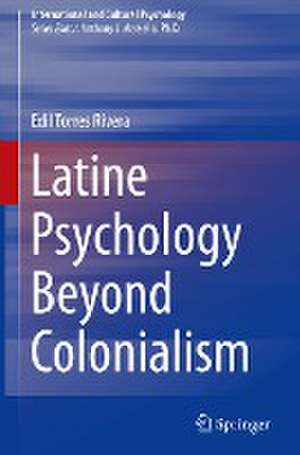Latine Psychology Beyond Colonialism: International and Cultural Psychology
Autor Edil Torres Riveraen Limba Engleză Hardback – 14 dec 2023
It will serve to bring new insights to those studying this group, as well as the many mental health workers that provide services. The result is an identification of a native psychology that is uniquely tailored to these particular individuals.
Din seria International and Cultural Psychology
- 18%
 Preț: 1117.03 lei
Preț: 1117.03 lei - 17%
 Preț: 490.68 lei
Preț: 490.68 lei - 15%
 Preț: 587.02 lei
Preț: 587.02 lei - 15%
 Preț: 647.40 lei
Preț: 647.40 lei - 5%
 Preț: 718.10 lei
Preț: 718.10 lei - 24%
 Preț: 797.37 lei
Preț: 797.37 lei - 20%
 Preț: 564.51 lei
Preț: 564.51 lei - 18%
 Preț: 1693.62 lei
Preț: 1693.62 lei - 18%
 Preț: 1010.48 lei
Preț: 1010.48 lei - 18%
 Preț: 784.13 lei
Preț: 784.13 lei - 18%
 Preț: 780.52 lei
Preț: 780.52 lei - 18%
 Preț: 946.24 lei
Preț: 946.24 lei - 15%
 Preț: 641.85 lei
Preț: 641.85 lei - 18%
 Preț: 952.57 lei
Preț: 952.57 lei - 5%
 Preț: 1031.68 lei
Preț: 1031.68 lei - 15%
 Preț: 637.13 lei
Preț: 637.13 lei - 5%
 Preț: 708.78 lei
Preț: 708.78 lei - 15%
 Preț: 476.75 lei
Preț: 476.75 lei - 18%
 Preț: 1120.18 lei
Preț: 1120.18 lei - 15%
 Preț: 638.76 lei
Preț: 638.76 lei - 20%
 Preț: 556.09 lei
Preț: 556.09 lei - 15%
 Preț: 700.10 lei
Preț: 700.10 lei - 15%
 Preț: 703.52 lei
Preț: 703.52 lei - 5%
 Preț: 1095.90 lei
Preț: 1095.90 lei - 18%
 Preț: 999.94 lei
Preț: 999.94 lei - 24%
 Preț: 842.27 lei
Preț: 842.27 lei - 15%
 Preț: 646.62 lei
Preț: 646.62 lei - 18%
 Preț: 953.35 lei
Preț: 953.35 lei - 18%
 Preț: 892.74 lei
Preț: 892.74 lei - 5%
 Preț: 1098.27 lei
Preț: 1098.27 lei - 20%
 Preț: 552.44 lei
Preț: 552.44 lei - 15%
 Preț: 649.54 lei
Preț: 649.54 lei - 18%
 Preț: 785.55 lei
Preț: 785.55 lei - 18%
 Preț: 947.67 lei
Preț: 947.67 lei - 18%
 Preț: 947.98 lei
Preț: 947.98 lei - 18%
 Preț: 952.26 lei
Preț: 952.26 lei
Preț: 776.27 lei
Preț vechi: 946.66 lei
-18% Nou
Puncte Express: 1164
Preț estimativ în valută:
148.56€ • 153.47$ • 123.64£
148.56€ • 153.47$ • 123.64£
Carte tipărită la comandă
Livrare economică 26 martie-09 aprilie
Preluare comenzi: 021 569.72.76
Specificații
ISBN-13: 9783031461040
ISBN-10: 3031461045
Pagini: 49
Ilustrații: XVI, 49 p.
Dimensiuni: 155 x 235 mm
Greutate: 0.28 kg
Ediția:1st ed. 2023
Editura: Springer International Publishing
Colecția Springer
Seria International and Cultural Psychology
Locul publicării:Cham, Switzerland
ISBN-10: 3031461045
Pagini: 49
Ilustrații: XVI, 49 p.
Dimensiuni: 155 x 235 mm
Greutate: 0.28 kg
Ediția:1st ed. 2023
Editura: Springer International Publishing
Colecția Springer
Seria International and Cultural Psychology
Locul publicării:Cham, Switzerland
Cuprins
History.- Colonization (Colonization tools and stages).- Liberation and Decolonization (Critical thinking and consciousness; decolonization stages).- Knowledge and Research (Indigenous Way of Knowing).- Applications and Future Directions.
Notă biografică
Dr. Edil Torres Rivera is interested in multicultural counseling, group work, chaos theory, liberation psychology, technology, supervision, multicultural counseling, prisons, Puerto Rican studies, identity development, and gang-related behavior. Specifically, his primary research focuses on complexity and how indigenous healing techniques are a necessary ingredient when working with ethnic minority populations in the United States. Dr. Torres has additional interests in studying the implications of social injustice and oppression in counseling and psychotherapy with ethnic minorities, in particular, with school age Latinos/Latinas in the United States. His work has appeared in the Journal of Multicultural Counseling and Development, Journal of Counseling and Development, Journal of Addictions and Offender Counseling, Radical Psychology Journal, Journal of Humanistic Counseling, Education and Development, Intervention in School and Clinic Journal, Counselor Education and Supervision Journal, Journal for Specialists in Group Work, Journal of Psychological Practice, Educational Technology, Computers in the Schools, Counseling and Values Journal, Journal of Technology in Counseling, and the Canadian Journal of Counselling. He was part of the editorial boards of the Journal of Counseling and Development and Counselor Education and Supervision Journal/. Presently he serves in the editorial boards of the Journal for Social Action in Counseling and Psychology, the Canadian Journal of Counselling and he is the editor of the Interamerican Journal of Psychology..
Textul de pe ultima copertă
This book examines colonial structure as it applies to Latine populations and demonstrates how the remnants of that structure continue to affect this ethnic group. It reveals the racist underpinnings of the colonial perspective and its ability to undermine psychological stability. Many psychologists dealing with this population focus on individual deficits or disorders without the clarifying lens of social justice. Countering that, this book unravels the various strands of socio-political stressors and the disabling effects of lingering oppression. It brings important new insights for mental health professionals as well as researchers, offering an identification of a native psychology that is uniquely tailored to this population.
· Emphasizes the structural violence component
· Fosters understanding of colonialism as an ongoing event · Provides a decolonization and decoloniality perspective that is not found in other publications.
· Emphasizes the structural violence component
· Fosters understanding of colonialism as an ongoing event · Provides a decolonization and decoloniality perspective that is not found in other publications.
Caracteristici
Emphasizes the structural violence component Fosters understanding of colonialism as an ongoing event Provides a decolonization and decoloniality perspective that is not found in other publications
